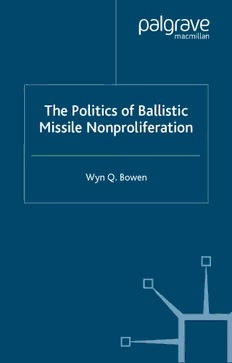
The Politics of Ballistic Missile Nonproliferation (Southampton studies in international policy) PDF
291 Pages·2000·0.974 MB·English
Most books are stored in the elastic cloud where traffic is expensive. For this reason, we have a limit on daily download.
Preview The Politics of Ballistic Missile Nonproliferation (Southampton studies in international policy)
Description:
During the presidency of George Bush (1989-93), the proliferation of nuclear, chemical and biological weapons, and the ballistic missiles capable of delivering them, rose greatly in significance as issues on the American security agenda. This occurred as a result of the demise of the global Soviet nuclear and conventional military threat to the United States and an increased awareness of proliferation to developing countries in areas of strategic significance such as the Middle East. The Politics of Ballistic Missile Nonproliferation examines why and how the Executive Branch and Congress sought to improve American and international efforts to restrict the horizontal proliferation of ballistic missiles during this period. Attention is focused on the political, bureaucratic and systemic issues that interacted to determine the outcome of efforts by certain elements of the executive branch and several congressmen to enhance domestic and multilateral implementation of the Missile Technology Control Regime.
See more
The list of books you might like
Most books are stored in the elastic cloud where traffic is expensive. For this reason, we have a limit on daily download.
